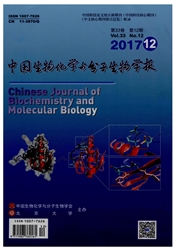

 中文摘要:
中文摘要:
前蛋白转化酶枯草溶菌素9(PCSK9)基因属于前蛋白转化酶(PC)家族,由信号肽、前结构域、催化结构域和羧基末端结构域组成.大量研究发现,PCSK9能介导低密度脂蛋白受体(LDLR)降解,调节血浆LDL胆固醇(LDL—C)水平;而PCSK9的两类主要突变,功能获得型、功能缺失型可分别导致高胆固醇血症和低胆固醇血症.因而研究PCSK9对相关心血管疾病的防治有重要意义.PCSK9结构特性与其生化功能密切相关,突变致使其调节胆固醇代谢的机制更为复杂.本文旨在总结PCSK9结构与功能的分子生物学特性,并指出目前研究中存在的问题,以利对PCSK9的进一步探索.
 英文摘要:
英文摘要:
Proprotein convertase (PC) subtilisin/kexin type 9 (PCSK9) is a serine protease of the PC family. The overall domain structure of PCSK9 is similar to those of other PC family members which include a signal peptide, followed by a prodomain, a subtilisin-like catalytic domain, and a variable C-terminal domain. PCSK9 exerts its effect on plasma low density lipoprotein cholesterol (LDL-C) levels by mediating LDL receptor (LDLR) protein degradation. Several gain-of-function and loss-of-function mutations in the PCSK9 gene, that occur naturally, have been identified and linked to hypercholesterolemia and hypocholesterolemia, respectively. Therefore, the investigation on PCSK9 will be helpful for the prevention and treatment of cardiovascular diseases with disorders of cholesterol metabolism. The biological function of PCSK9 is deeply associated with its molecular structure. Various mutations of PCSK9 can result in alterations of its structure and more complicated mechanisms for modulation of cholesterol metabolism. The objective of this review is to summarize the current information involving the structure and function of PCSK9 in molecular biology and to identify "unknowns" in this research area, which will provide necessary suggestions for the following study.
 同期刊论文项目
同期刊论文项目
 同项目期刊论文
同项目期刊论文
 期刊信息
期刊信息
